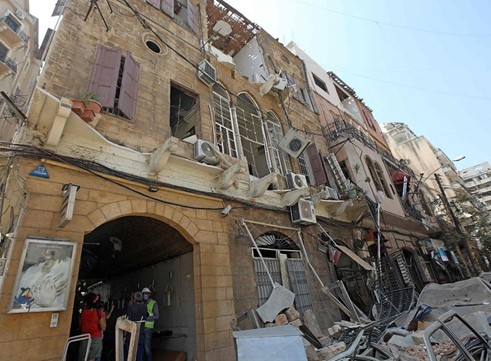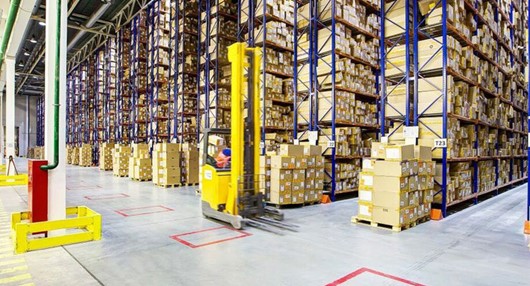Small Business, Big Impact
Why the SME Sector is Key to Lebanon’s Recovery
As countries grapple with the consequences of a global pandemic and its impact on the economy, there is a growing interest in maintaining and protecting the role of small and medium-sized enterprises (SMEs) as key drivers behind many economies worldwide. In Lebanon, and amid seemingly insurmountable challenges formed around a nexus of political vacuum, economic strife, and weak infrastructure, SMEs now face unprecedented barriers. According to a report by the World Bank in 2018, SMEs in Lebanon represent 95% of companies and make up 50% of the total labor force. The Lebanese Ministry of Economy and Trade also estimates that they contribute to approximately 40% of Lebanon’s GDP. Prior to the last 2 years, SMEs in Lebanon enjoyed an enabling environment for growth, having had the financial support of Banque Du Liban (BDL) over the past decade, with the Circular 331 that had encouraged financial institutions, accelerators, and venture capitals to invest in SMEs and startups. But businesses now suffer the consequences of a banking system in full-blown crisis, hyperinflation, imposed capital controls, increasing poverty rates, and periodic civil unrest, all exacerbated by the deadly explosion of Beirut’s port on the 4th of August. Despite SMEs being a key engine for economic growth and job creation, political and financial challenges have diluted the impact of efforts to keep them as the backbone of Lebanon’s economy.
In line with the company’s DNA to support businesses with a social and economic impact in Lebanon and our commitment to contribute to the economic resilience of Lebanese business owners, Euromena Consulting has taken an active role over the past 5 years in supporting SMEs across different geographies and industries to enhance their operations and strengthen their ability to navigate local economic challenges. So what has Euromena Consulting’s team in Beirut been doing to support SMEs in recent months and why is their revival so important for Lebanon?

Source: Gulf News article. Title: Beirut Blast: A shattered Beirut leaves Lebanese asking if they have a future. Image Credit: AFP
Navigating the Crises
As part of its work in Lebanon and its belief in the role and the contribution of this sector to the country’s economic recovery, Euromena Consulting has served over 60 SMEs through our work and close collaboration with international donor organizations. As service providers, we have worked with SMEs in the manufacturing, agriculture, technology, retail, and FMCG sectors among others, providing customized business advisory support centered around three focal areas:
• Financial and operational enhancement
Lebanon's financial crisis, which led to the collapse of the Lebanese pound, has had an especially negative impact on SMEs that were already struggling to remain viable in Lebanon’s economy. From late 2019, and with the onset of the popular October 17 revolution, Lebanon’s currency plummeted to record lows and has since lost more than 80% of its value. SMEs, considered the lifeline for many local communities, had to endure the burden of these challenges and especially in the capital where many were physically affected by the explosion of Beirut’s port. Based on market priorities, our team in Beirut has been working hand in hand with business owners to assess the impact of this crisis and assist them in navigating financial and operational challenges stemming from the existence of multiple exchange rates, hyperinflation, and national lockdown measures.
“SMEs are operating in an impossible environment, with the economy going through an unprecedented financial crisis due to the combination of two extreme factors: the insolvency of the central bank and commercial banks, and a severe case of stagflation,” says Elie Baho, Manager in our Beirut office.
Our team provides customized advisory and coaching sessions to help streamline and improve businesses’ internal operations, organizational structures, governance models, and financial planning and budgeting processes. We help SMEs focus on maximizing their profit margin by developing new financial management models that take into account the fluctuations in the exchange rate, decrease capital costs, and create employment opportunities.
• Investment attraction and/or export market penetration
Secondly, keeping in mind the nature of Lebanon's economy being largely a consumer market with a high dependency on services and trade, SMEs continue to rely heavily on trade and are now unable to handle the complexity of this matter as compared to larger players in the market. Our team works to attract key investor groups ranging from family-oriented funds to venture capitals to ensure businesses are provided with tangible support to export as well as prepare them to enter foreign markets. Over the last 3 months, and as a result of the destruction caused in the Beirut port, businesses have suffered to develop strategies to enter external markets and as such, our team has supported them by building partnerships with potential retailers in outside markets and increasing the visibility of local businesses by digitizing the purchase of their services and products. Celine Khalil, Senior Consultant leading multiple workstreams with SMEs, says
“By implementing new marketing strategies with one of our SMEs in the e-commerce sector, we established partnerships with 7 Lebanese producers to increase the visibility of their products in external markets, sell internationally, and attract fresh funds to sustain their businesses.”
This has allowed the business to increase its presence in new markets worldwide, curtailing its dependency on the local market.

Source: Lebanon Business News, Ministry of Industry. Title: Industrial raw materials exempted from Customs hike. Council of Ministers needs to approve list of exempted products.
• Product and service outreach
Finally, lack of access to market-driven data on consumer behavior and sector trends keeps businesses from increasing their product and service outreach. For this reason, our team works to tailor marketing and sales strategies based on firsthand market research and best practices to maximize product and service outreach. We work to match businesses with potential buyers in the local market for sales generation and regularly complement this process by creating or refining the business’s social media presence to enhance communication channels with retailers. Our strategies vary from supporting early-stage companies in defining their customer base in line with local consumer spending patterns, to supporting well-established businesses in better positioning their products or services by optimizing their pricing and promotion strategies. By conducting extensive analysis on the relevant markets and business positioning, we focus on windows for improvement to increase companies' market share.
“For one of our clients in the F&B sector, we recommended adjusting the prices of their products in line with the surge in local prices and as a result, we projected a 15% increase in their profits,” says Jawdat Shakaroun, Consultant in our Beirut office.
Hope for Revival
As SMEs fight to remain the catalyst for entrepreneurship, innovation, and economic growth, our role is to support them in any way possible to enhance their capabilities, improve their access to markets, and overall develop the surrounding business environment by attracting global investment and interest in Lebanon. Solutions are now continuing to emerge as communities and local businesses struggle to look beyond state corruption to form their own collectives of success and resilience. Lebanon is also witnessing an influx of international support from global entities such as the World Bank Group, the European Union (EU), and the United Nations (UN) that have recently launched an 18-month Lebanon Reform, Recovery and Reconstruction Framework (3RF) aimed at addressing the needs of the population affected by the explosion, including SMEs and local businesses that require continuous and sustainable support to maintain and expand their operations.
Euromena Consulting’s focus has always been to position business for further growth by supporting their social and economic sustainability in key target sectors. While the road to economic recovery may be long and arduous given the state of political deadlock that Lebanon is in, there is power in finding new avenues for development, such as increasing the capabilities of SMEs to provide goods and services that will soon vanish from Lebanon’s import-dependent market and consequently boost local production and economic revival. As SMEs fight to remain the catalyst for entrepreneurship, innovation, and economic growth, our role is to support them in any way possible to enhance their capabilities, improve their access to markets, and overall develop the surrounding business environment by attracting global investment and interest in Lebanon.

Source: Al Arabiya article. Title: Lebanon unveils compensation program for Beirut blast devastated homes, businesses. Image Credit: Reuters
By Poliana Geha, Senior Consultant at Euromena Consulting